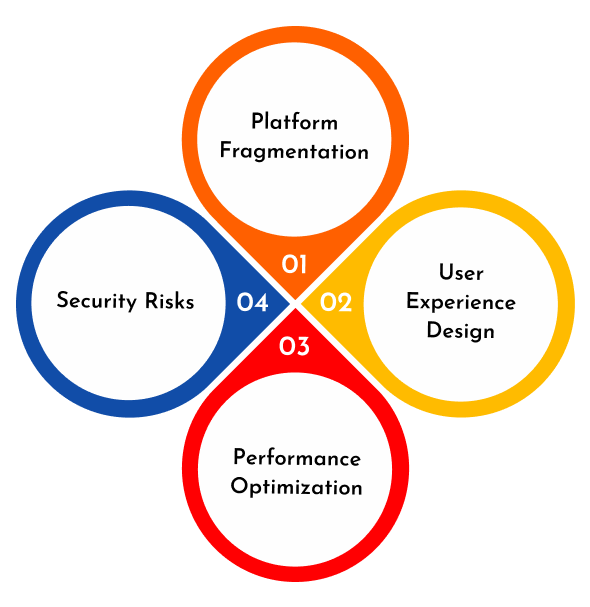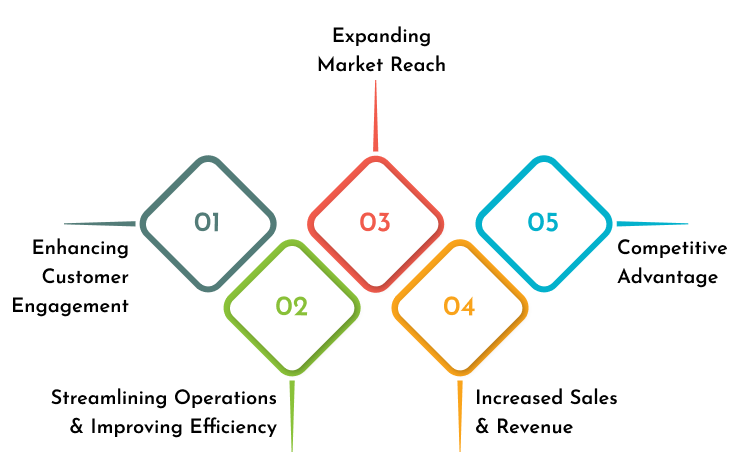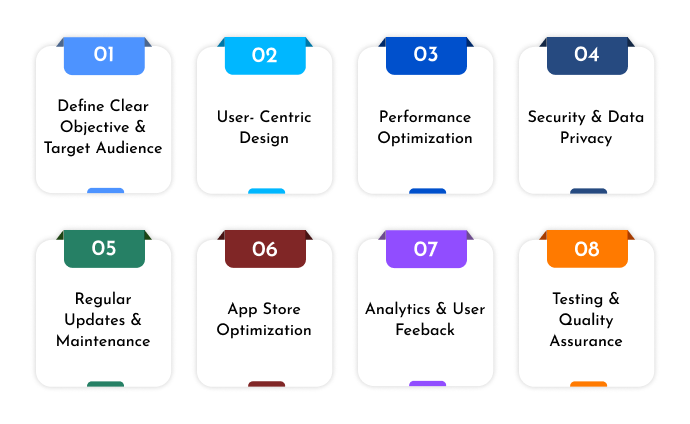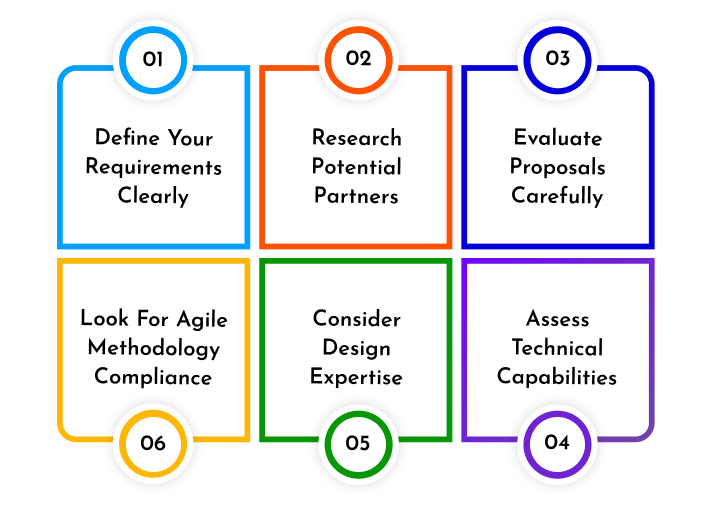- Mar 12, 2024
- Mobile App Development
- 28558
Share this post on:

In today's digital age, mobile apps have seen remarkable hype among individuals and organizations. Mobile apps have become essential tools for businesses looking to reach their customers and provide them with personalized experiences. However, developing high-quality mobile applications that meet user expectations can pose significant challenges.
Mobile App Development Challenges
Here are a few challenges faced by developers during the process of creating mobile apps.

Platform Fragmentation: One major challenge facing mobile app developers is platform fragmentation. With multiple operating systems available, such as iOS and Android, developers must ensure compatibility across different devices and versions of these platforms. This requires extra time and resources to test and optimize the application for each platform. Moreover, within each platform, there are numerous device models with varying screen sizes, resolutions, and hardware capabilities. This fragmentation poses a significant challenge for developers as they need to ensure their app functions seamlessly on a wide range of devices. They must thoroughly test their app on different platforms and devices to identify and fix compatibility issues.
User Experience Design: Designing a seamless and intuitive user experience is critical for any successful mobile app. Developers need to create interfaces that are easy to navigate and offer value to users. This involves understanding user behavior patterns and preferences, which can vary greatly depending on demographics and device type. Additionally, designing for multiple platforms adds complexity, as each platform has its own UI design principles and guidelines. Developers need to strike a balance between adhering to platform-specific design patterns and maintaining a consistent brand identity across different platforms.
Performance Optimization: Performance optimization is another crucial aspect of mobile app development. Users expect fast load times and smooth navigation throughout the app. To achieve this, developers must consider factors like network latency, data usage, and hardware limitations when designing the app architecture. Furthermore, mobile apps often rely on internet connectivity for data synchronization and real-time updates. This introduces additional challenges as developers need to handle scenarios where the network connection is weak or intermittent. They must implement strategies like caching data, handling offline mode gracefully, and minimizing network requests to provide a seamless experience even in challenging network conditions.
Security Risks: Security risks are a constant concern for developers and users. Hackers are constantly seeking new ways to exploit vulnerabilities in mobile apps, making security a top priority. Developers must implement robust encryption methods and regularly update their apps to address potential threats.
Integrating Third-Party Services: Many mobile apps rely on third-party services to enhance functionality or access external APIs. Integrating these services into the app can introduce additional complexity and require careful consideration of data privacy regulations.
Tips to Follow While Choosing A Mobile App Development Company
Choosing the right mobile app development company is one of the most important decisions for businesses that are looking to create a custom application tailored to their specific needs. Here are some tips to help you select the best partner for your project:
Define Your Requirements Clearly: Start by defining your requirements clearly so that you know what you want out of the app. Consider factors like functionality, design, target audience, platform compatibility, and budget. Having a clear understanding of your goals will help you evaluate proposals more effectively.
Research Potential Partners: Once you have defined your requirements, research potential partners who specialize in mobile app development. Look at their portfolios, case studies, and client reviews to gauge their expertise and track record. You can find companies through online directories, referrals from colleagues or friends, or by attending industry events.
Evaluate Proposals Carefully: After narrowing down your list of potential partners, request detailed proposals from each one. Review their proposed timeline, milestones, deliverables, pricing structure, and communication plan. Make sure the proposal aligns well with your initial requirements and offers value beyond just coding the app.
Assess Technical Capabilities: Check if the chosen partner has the technical capabilities to build the desired features using modern technologies and methodologies. For example, ask questions related to their proficiency in cross-platform frameworks, cloud computing, machine learning, or the Internet of Things (IoT).
Consider Design Expertise: Good visual design plays a vital role in creating engaging experiences for end-users. Therefore, assess the design skills of the partner by evaluating their past projects and asking for examples of UI/UX designs tailored for specific screen sizes and resolutions.
Look for Agile Methodology Compliance: Agile methodology emphasizes collaboration, flexibility, and iterative improvement throughout the development lifecycle. If you prefer working with agile principles, check if the partner follows Scrum or Kanban methodologies.
How Mobile App Development Is Helping Businesses Thrive
With the rapid advancement of technology, mobile app development has become increasingly important for businesses looking to expand their customer base and streamline operations. From e-commerce to service industries, mobile apps are transforming how businesses interact with consumers and drive growth. In this article, we discuss how mobile app development is assisting businesses in achieving their objectives and staying ahead of the competition.

Enhancing Customer Engagement: Customer engagement is a critical factor in determining the success of any business. Mobile app development provides businesses with an opportunity to connect with customers in real time and offer personalized experiences. Through push notifications, in-app messaging, and loyalty programs, businesses can foster long-term relationships with clients and increase brand loyalty. Moreover, mobile apps enable businesses to gather valuable customer insights through analytics and feedback mechanisms, allowing them to tailor products and services accordingly.
Streamlining Operations and Improving Efficiency: Mobile app development allows businesses to automate processes and reduce manual labor costs. For instance, businesses can use mobile apps to manage inventory, track sales, and monitor employee performance. Additionally, mobile apps can simplify complex workflows by providing employees with access to real-time data and communication channels. As a result, businesses can operate more efficiently, minimize errors, and accelerate decision-making processes.
Expanding Market Reach: Mobile app development enables businesses to reach a wider audience and tap into new markets. By offering mobile payment options, businesses can attract customers who prefer the convenience of online transactions. Furthermore, location-based marketing strategies can target specific audiences based on geographic locations, enabling businesses to maximize their advertising efforts.
Increased Sales and Revenue: Mobile apps provide businesses with a direct sales channel, enabling them to generate additional revenue. By integrating e-commerce functionalities into their mobile apps, businesses can facilitate seamless transactions and increase sales. Moreover, mobile apps can leverage features like personalized recommendations and targeted promotions based on customer preferences, driving impulse purchases and upselling opportunities. Additionally, mobile apps can integrate with loyalty programs, allowing businesses to reward customers for their continued support and encourage repeat purchases.
Competitive Advantage: In today's highly competitive market, having a mobile app can give businesses a significant edge over their competitors. A well-designed and user-friendly mobile app enhances the overall brand image and customer perception. It showcases a business's commitment to innovation and customer-centricity, attracting more customers and building trust. Furthermore, businesses that offer a seamless mobile experience are more likely to retain existing customers and attract new ones. By staying ahead of the curve in terms of technology adoption, businesses can establish themselves as industry leaders.
Mobile App Development: Best Practices
Mobile app development has become an integral part of the digital landscape, with millions of apps available for download on various platforms. As the demand for mobile apps continues to grow, developers need to follow best practices to ensure the success and effectiveness of their creations. In this article, we will explore the top best practices of mobile app development.

Define Clear Objectives and Target Audience: Before starting the development process, it is crucial to define clear objectives for the app. What problem does it solve? What value does it provide to users? Defining these objectives helps in creating a focused and purposeful app. Additionally, identifying the target audience is essential, as it allows developers to tailor the app's features and design to meet their specific needs and preferences.
User-Centric Design: A user-centric design approach is vital for creating successful mobile apps. The user interface (UI) and user experience (UX) should be intuitive, visually appealing, and easy to navigate. The design should prioritize simplicity and efficiency, ensuring that users can accomplish their tasks quickly and effortlessly. Conducting user research, usability testing, and incorporating user feedback throughout the development process can help create a seamless user experience.
Performance Optimization: Performance optimization plays a significant role in the success of a mobile app. To achieve optimal performance, developers should focus on minimizing app size, reducing loading times, and optimizing resource usage. Techniques like code optimization, caching, lazy loading, and asynchronous processing can significantly improve app performance.
Security and Data Privacy: Mobile apps often handle sensitive user data, making security and data privacy critical considerations. Developers should implement robust security measures to protect user information from unauthorized access or breaches. This includes encrypting data transmission, implementing secure authentication mechanisms, and adhering to industry-standard security practices. Additionally, complying with data protection regulations like GDPR (General Data Protection Regulation) is essential to ensuring user trust and avoiding legal consequences.
Regular Updates and Maintenance: Mobile app development is an ongoing process that doesn't end with the initial release. Regular updates and maintenance are necessary to address bugs, introduce new features, improve performance, and enhance security. Monitoring user feedback, conducting regular testing, and staying up-to-date with the latest industry trends are crucial for maintaining a successful mobile app.
App Store Optimization (ASO): ASO involves optimizing keywords, app titles, descriptions, screenshots, and reviews to increase visibility and attract more downloads. By implementing ASO techniques, developers can improve their app's discoverability and reach a wider audience.
Analytics and User Feedback: Collecting analytics data and gathering user feedback is essential for understanding how users interact with the app. Analytics tools provide valuable insights into user behavior, allowing developers to identify areas for improvement and make data-driven decisions. User feedback through ratings, reviews, surveys, or in-app feedback forms can also provide valuable insights for enhancing the app's functionality and addressing user concerns.
Testing and Quality Assurance: Thorough testing and quality assurance are crucial steps in mobile app development. Developers should conduct various types of testing, including functional testing, compatibility testing, performance testing, and security testing, to ensure the app works as intended across different devices and scenarios. Automated testing tools can help streamline the testing process and identify potential issues early on.
Conclusion: Overcoming Mobile App Development Challenges
The development of mobile apps faces several challenges that can make it difficult to deliver a product that meets user needs while remaining profitable. These challenges include platform fragmentation, performance optimization, security risks, integrating third-party services, testing and quality assurance, and staying up-to-date with technology trends. However, by adopting agile methodologies, leveraging automation tools, collaborating closely with stakeholders, and continuously learning and adapting, developers can overcome these hurdles and build successful mobile apps.
Ultimately, the key to success lies in embracing change and approaching each project with a willingness to learn and improve. By doing so, developers can create innovative solutions that not only meet user requirements but exceed their expectations, helping companies thrive in today's rapidly evolving digital landscape.












